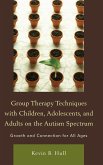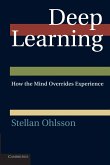Alexithymia
Herausgeber: Luminet, Olivier; Taylor, Graeme J.; Bagby, R. Michael
Alexithymia
Herausgeber: Luminet, Olivier; Taylor, Graeme J.; Bagby, R. Michael
- Gebundenes Buch
- Merkliste
- Auf die Merkliste
- Bewerten Bewerten
- Teilen
- Produkt teilen
- Produkterinnerung
- Produkterinnerung
In response to clinical need, this important new book covers in depth the research, theory and clinical issues surrounding alexithymia.
Andere Kunden interessierten sich auch für
![Alexithymia Alexithymia]() Alexithymia42,99 €
Alexithymia42,99 €![Group Therapy Techniques with Children, Adolescents, and Adults on the Autism Spectrum Group Therapy Techniques with Children, Adolescents, and Adults on the Autism Spectrum]() Kevin B. HullGroup Therapy Techniques with Children, Adolescents, and Adults on the Autism Spectrum99,99 €
Kevin B. HullGroup Therapy Techniques with Children, Adolescents, and Adults on the Autism Spectrum99,99 €![The Cambridge Handbook of the Learning Sciences The Cambridge Handbook of the Learning Sciences]() The Cambridge Handbook of the Learning Sciences180,99 €
The Cambridge Handbook of the Learning Sciences180,99 €![Chaos and Complexity in Psychology Chaos and Complexity in Psychology]() Chaos and Complexity in Psychology52,99 €
Chaos and Complexity in Psychology52,99 €![Deep Learning Deep Learning]() Stellan OhlssonDeep Learning65,99 €
Stellan OhlssonDeep Learning65,99 €![Gestalt Psychology in German Culture, 1890 1967 Gestalt Psychology in German Culture, 1890 1967]() Mitchell G. AshGestalt Psychology in German Culture, 1890 196765,99 €
Mitchell G. AshGestalt Psychology in German Culture, 1890 196765,99 €![Voices of Collective Remembering Voices of Collective Remembering]() James V. WertschVoices of Collective Remembering70,99 €
James V. WertschVoices of Collective Remembering70,99 €-
-
-
In response to clinical need, this important new book covers in depth the research, theory and clinical issues surrounding alexithymia.
Produktdetails
- Produktdetails
- Verlag: Cambridge University Press
- Seitenzahl: 378
- Erscheinungstermin: 27. September 2018
- Englisch
- Abmessung: 260mm x 208mm x 25mm
- Gewicht: 1031g
- ISBN-13: 9781108416641
- ISBN-10: 1108416640
- Artikelnr.: 52418545
- Herstellerkennzeichnung
- Libri GmbH
- Europaallee 1
- 36244 Bad Hersfeld
- gpsr@libri.de
- Verlag: Cambridge University Press
- Seitenzahl: 378
- Erscheinungstermin: 27. September 2018
- Englisch
- Abmessung: 260mm x 208mm x 25mm
- Gewicht: 1031g
- ISBN-13: 9781108416641
- ISBN-10: 1108416640
- Artikelnr.: 52418545
- Herstellerkennzeichnung
- Libri GmbH
- Europaallee 1
- 36244 Bad Hersfeld
- gpsr@libri.de
List of contributors; Foreword; Preface Mark A. Lumley; Acknowledgements;
Part I. History, Assessment, and Cultural Shaping of Alexithymia: 1.
History of alexithymia: the contributions of psychoanalysis Graeme J.
Taylor; 2. Assessment of the alexithymia construct Angela Sekely, R.
Michael Bagby and Piero Porcelli; 3. The cultural shaping of alexithymia
Andrew Ryder, Momoka Sunohara, Jessica Dere and Yulia E. Chentsova-Dutton;
Part II. Emotion and Cognitive Processing: 4. Emotion knowledge and emotion
regulation in alexithymia Olivier Luminet and Giorgia Zamariola; 5. Memory
and executive functions in alexithymia Nicolas Vermeulen, Irena Domachowska
and Kristy A. Nielson; 6. Language processing in alexithymia Carlotta
Welding and Dalya Samur; Part III. Clinical Issues and Somatic and
Psychiatric Pathology: 7. Alexithymia and physical illness Piero Porcelli
and Graeme J. Taylor; 8. Attachment, trauma, and alexithymia Adriano
Schimmenti and Vincenzo Caretti; 9. Relations between alexithymia and
depressive and anxiety disorders and personality Kirsi Honkalampi, Domenico
De Berardis, Federica Vellante and Heimo Viinamäki; 10. Alexithymia and
maladaptive regulatory behaviors in substance use disorders and eating
disorders Kristen P. Morie and Nathan Ridout; 11. Social and interpersonal
implications of alexithymia Delphine Grynberg, Sylvie Berthoz and Geoffrey
Bird; 12. Therapeutic issues John S. Ogrodniczuk, David Kealy, George A.
Hadjipavlou and Kristjana Cameron; Part IV. Biological Considerations: 13.
Neuroimaging studies of alexithymia Katharina S. Goerlich and André Aleman;
14. Electrophysiology of alexithymia Katharina S. Goerlich; 15. Genetic
factors and endocrine and immune system functioning associated with
alexithymia Michiko Kano, Hans Jörgen Grabe and Jan Terock; 16. Processing
emotions in alexithymia: a systematic review of physiological markers
Georgia Panayiotou, Maria Panteli and Elke Vlemincx; 17. Alexithymia and
body awareness Olga Pollatos and Beate M. Herbert; 18. Conclusions and
future directions Graeme J. Taylor, R. Michael Bagby and Olivier Luminet;
Index.
Part I. History, Assessment, and Cultural Shaping of Alexithymia: 1.
History of alexithymia: the contributions of psychoanalysis Graeme J.
Taylor; 2. Assessment of the alexithymia construct Angela Sekely, R.
Michael Bagby and Piero Porcelli; 3. The cultural shaping of alexithymia
Andrew Ryder, Momoka Sunohara, Jessica Dere and Yulia E. Chentsova-Dutton;
Part II. Emotion and Cognitive Processing: 4. Emotion knowledge and emotion
regulation in alexithymia Olivier Luminet and Giorgia Zamariola; 5. Memory
and executive functions in alexithymia Nicolas Vermeulen, Irena Domachowska
and Kristy A. Nielson; 6. Language processing in alexithymia Carlotta
Welding and Dalya Samur; Part III. Clinical Issues and Somatic and
Psychiatric Pathology: 7. Alexithymia and physical illness Piero Porcelli
and Graeme J. Taylor; 8. Attachment, trauma, and alexithymia Adriano
Schimmenti and Vincenzo Caretti; 9. Relations between alexithymia and
depressive and anxiety disorders and personality Kirsi Honkalampi, Domenico
De Berardis, Federica Vellante and Heimo Viinamäki; 10. Alexithymia and
maladaptive regulatory behaviors in substance use disorders and eating
disorders Kristen P. Morie and Nathan Ridout; 11. Social and interpersonal
implications of alexithymia Delphine Grynberg, Sylvie Berthoz and Geoffrey
Bird; 12. Therapeutic issues John S. Ogrodniczuk, David Kealy, George A.
Hadjipavlou and Kristjana Cameron; Part IV. Biological Considerations: 13.
Neuroimaging studies of alexithymia Katharina S. Goerlich and André Aleman;
14. Electrophysiology of alexithymia Katharina S. Goerlich; 15. Genetic
factors and endocrine and immune system functioning associated with
alexithymia Michiko Kano, Hans Jörgen Grabe and Jan Terock; 16. Processing
emotions in alexithymia: a systematic review of physiological markers
Georgia Panayiotou, Maria Panteli and Elke Vlemincx; 17. Alexithymia and
body awareness Olga Pollatos and Beate M. Herbert; 18. Conclusions and
future directions Graeme J. Taylor, R. Michael Bagby and Olivier Luminet;
Index.
List of contributors; Foreword; Preface Mark A. Lumley; Acknowledgements;
Part I. History, Assessment, and Cultural Shaping of Alexithymia: 1.
History of alexithymia: the contributions of psychoanalysis Graeme J.
Taylor; 2. Assessment of the alexithymia construct Angela Sekely, R.
Michael Bagby and Piero Porcelli; 3. The cultural shaping of alexithymia
Andrew Ryder, Momoka Sunohara, Jessica Dere and Yulia E. Chentsova-Dutton;
Part II. Emotion and Cognitive Processing: 4. Emotion knowledge and emotion
regulation in alexithymia Olivier Luminet and Giorgia Zamariola; 5. Memory
and executive functions in alexithymia Nicolas Vermeulen, Irena Domachowska
and Kristy A. Nielson; 6. Language processing in alexithymia Carlotta
Welding and Dalya Samur; Part III. Clinical Issues and Somatic and
Psychiatric Pathology: 7. Alexithymia and physical illness Piero Porcelli
and Graeme J. Taylor; 8. Attachment, trauma, and alexithymia Adriano
Schimmenti and Vincenzo Caretti; 9. Relations between alexithymia and
depressive and anxiety disorders and personality Kirsi Honkalampi, Domenico
De Berardis, Federica Vellante and Heimo Viinamäki; 10. Alexithymia and
maladaptive regulatory behaviors in substance use disorders and eating
disorders Kristen P. Morie and Nathan Ridout; 11. Social and interpersonal
implications of alexithymia Delphine Grynberg, Sylvie Berthoz and Geoffrey
Bird; 12. Therapeutic issues John S. Ogrodniczuk, David Kealy, George A.
Hadjipavlou and Kristjana Cameron; Part IV. Biological Considerations: 13.
Neuroimaging studies of alexithymia Katharina S. Goerlich and André Aleman;
14. Electrophysiology of alexithymia Katharina S. Goerlich; 15. Genetic
factors and endocrine and immune system functioning associated with
alexithymia Michiko Kano, Hans Jörgen Grabe and Jan Terock; 16. Processing
emotions in alexithymia: a systematic review of physiological markers
Georgia Panayiotou, Maria Panteli and Elke Vlemincx; 17. Alexithymia and
body awareness Olga Pollatos and Beate M. Herbert; 18. Conclusions and
future directions Graeme J. Taylor, R. Michael Bagby and Olivier Luminet;
Index.
Part I. History, Assessment, and Cultural Shaping of Alexithymia: 1.
History of alexithymia: the contributions of psychoanalysis Graeme J.
Taylor; 2. Assessment of the alexithymia construct Angela Sekely, R.
Michael Bagby and Piero Porcelli; 3. The cultural shaping of alexithymia
Andrew Ryder, Momoka Sunohara, Jessica Dere and Yulia E. Chentsova-Dutton;
Part II. Emotion and Cognitive Processing: 4. Emotion knowledge and emotion
regulation in alexithymia Olivier Luminet and Giorgia Zamariola; 5. Memory
and executive functions in alexithymia Nicolas Vermeulen, Irena Domachowska
and Kristy A. Nielson; 6. Language processing in alexithymia Carlotta
Welding and Dalya Samur; Part III. Clinical Issues and Somatic and
Psychiatric Pathology: 7. Alexithymia and physical illness Piero Porcelli
and Graeme J. Taylor; 8. Attachment, trauma, and alexithymia Adriano
Schimmenti and Vincenzo Caretti; 9. Relations between alexithymia and
depressive and anxiety disorders and personality Kirsi Honkalampi, Domenico
De Berardis, Federica Vellante and Heimo Viinamäki; 10. Alexithymia and
maladaptive regulatory behaviors in substance use disorders and eating
disorders Kristen P. Morie and Nathan Ridout; 11. Social and interpersonal
implications of alexithymia Delphine Grynberg, Sylvie Berthoz and Geoffrey
Bird; 12. Therapeutic issues John S. Ogrodniczuk, David Kealy, George A.
Hadjipavlou and Kristjana Cameron; Part IV. Biological Considerations: 13.
Neuroimaging studies of alexithymia Katharina S. Goerlich and André Aleman;
14. Electrophysiology of alexithymia Katharina S. Goerlich; 15. Genetic
factors and endocrine and immune system functioning associated with
alexithymia Michiko Kano, Hans Jörgen Grabe and Jan Terock; 16. Processing
emotions in alexithymia: a systematic review of physiological markers
Georgia Panayiotou, Maria Panteli and Elke Vlemincx; 17. Alexithymia and
body awareness Olga Pollatos and Beate M. Herbert; 18. Conclusions and
future directions Graeme J. Taylor, R. Michael Bagby and Olivier Luminet;
Index.









